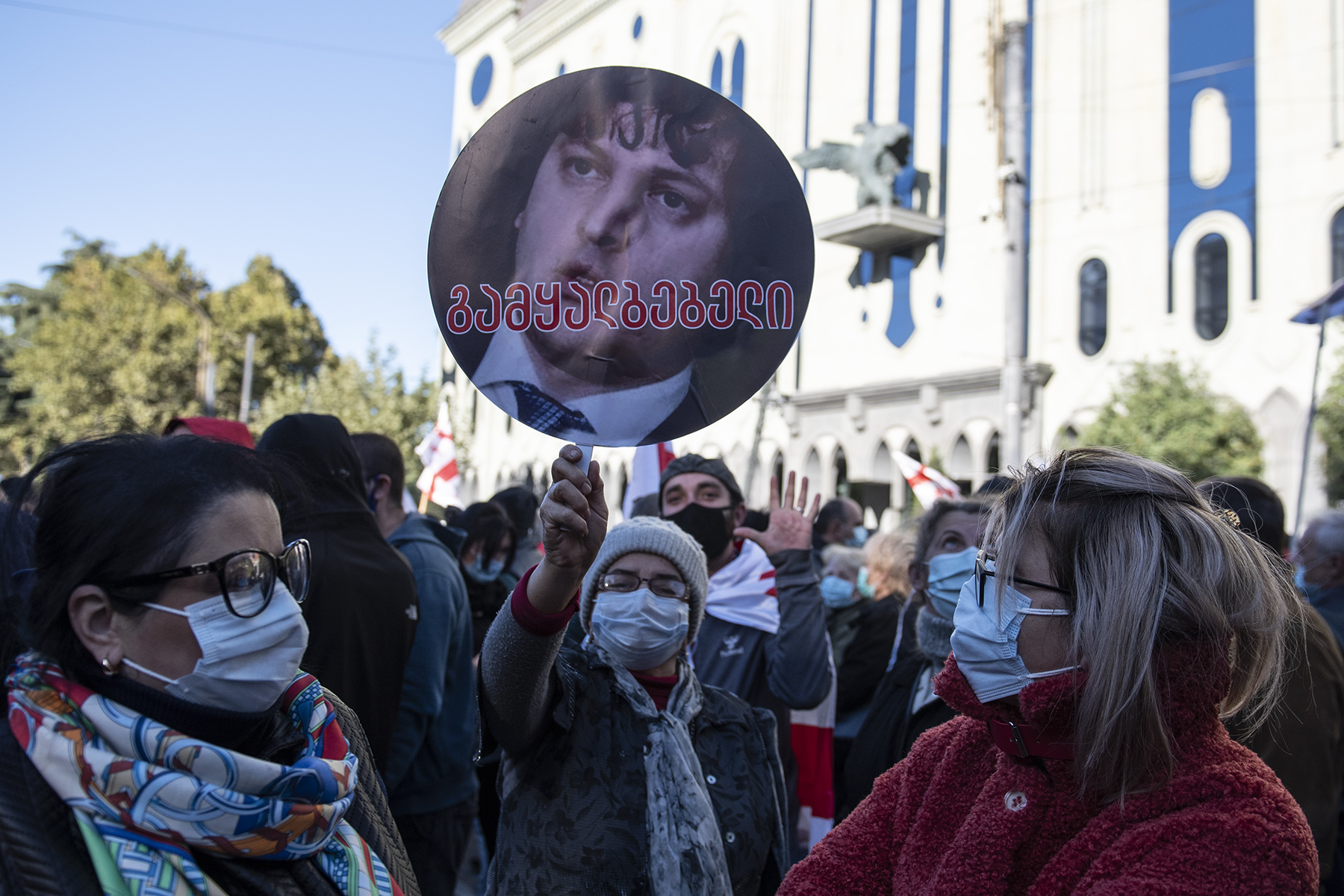Watchdogs back ex-security chief’s claim of ‘large-scale electoral fraud’ in Georgia

Two major watchdog groups have accused the Georgian Government of operating a scheme of large-scale electoral fraud over recent years, citing leaked documents from a former deputy head of the security services.
On Thursday, the International Society for Fair Elections And Democracy (ISFED) and Transparency International Georgia (TI) suggested the government had illegally offered pardons, pressured public employees, and misused administrative resources in order to influence the outcome of elections.
The groups based their findings on what they said were verified documents provided to them by the former Deputy Director of the State Security Service, Soso Gogashvili. Gogashvili was apprehended last week shortly after threatening to expose the government for falsifying elections.
[Read more on OC Media: Detained former security chief threatens to ‘expose’ Georgian Government]
According to the groups’ report, citing 2018–2019 correspondence from an email purportedly owned by the ruling Georgian Dream party and documents dated last year, thousands of people may have been offered benefits from several government bodies in exchange for assisting the ruling party in elections.
This included cancelling conditional sentences, providing early release from prison, restoring suspended driving licences, requalification of charges in ongoing criminal cases, improving the conditions of prison sentences, or postponement of military service.
The report also alleges that the ruling party terminated politically undesirable public employees, and deployed law enforcement officers to assist in campaign offices.
‘The scale of this scheme allows us to assume that as a result of interfering in the election process with such methods, it was possible to mobilise voters’ votes in favour of the ruling party on a large scale’, a joint statement by the groups read.
The scheme of abuse of administrative resources, vote buying, and illegal vote mobilisation could bring into question the results of the 2018 presidential and 2020 parliamentary elections.
Pardons for electoral help
To verify some of the information provided by Gogashvili, the groups requested several kinds of public information.
For example, information obtained from the National Probation Agency during the 2018 presidential election period, including the months before and after the second round, showed that the number of people whose sentences were revoked and whose suspended driving licences were restored was significantly higher than in other months of the year.
Non-custodial sentences are revoked or conviction records are removed through a Standing Commission under the Probation Agency, a subagency of the Justice Ministry.
Lists in the documents included the conditional sentences of individuals, their personal data, and requests to have those sentences slashed. Some included comments, according to the report, on which way the individuals were helpful to the ruling party.
For instance, a comment on one individual showcased in the report said that the person was conditionally sentenced to two years in prison six months prior, and that ‘the boy was from Saburtalo’.
‘He helps me both in Gldani and Saburtalo’, the author wrote, referring to Tbilisi districts.
Numbers obtained by the groups from the National Probation Agency showed that in January 2018, the Standing Commission revoked the conditional sentences or cleared the records of 33 individuals. In December that year — two months after the presidential vote — this number was 2,227.
The report noted that the Standing Commission convened 13 times in November and December 2018, while they had normally convened once a month.
The opposition United National Movement, whose candidate, Grigol Vashadze, lost to Georgian Dream-supported candidate Salome Zurabishvili, have never formally recognised the results of the election.

The report directly pinpointed former Deputy Justice Minister Giorgi Pataridze and the former head of the Interior Ministry’s General Inspection, Aleksandre Khojevanishvili, as those directly supervising the scheme.
Aleksandre Khojevanishvili worked in that position from 2017, until moving to the State Security Service. He resigned from this post in March 2021 and joined former Prime Minister Giorgi Gakharia’s For Georgia party.
According to the investigation, the lists of people being offered benefits were sent to [email protected], an address they said was operated by Georgian Dream, and later forwarded to [email protected] and [email protected], allegedly belonging to Giorgi Pataridze and Aleksandre Khojevanishvili.
The report additionally cited ‘up to 20’ requests purportedly sent by Georgian Dream representatives to the emails allegedly belonging to Pataridze and Khojevanishvili to replace criminal convictions with lighter sentences.
The investigation also potentially implicates the Revenue Service in deciding on tax debt restructuring issues upon politically motivated recommendations from the ruling party and the State Security Service.
‘Political dossiers’ on public employees
Referring to 2020 documents leaked to them by Gogashvili, TI and ISFED alleged that with the help of the State Security Service, the ruling party curated ‘political dossiers’ on public employees, including the heads of public schools.
The report said they cross-referenced those dossiers with public records that indicated the authorities did not extend the tenures of dozens of public school directors from autumn 2020 to summer 2021 due to their political views.
The dossiers included comments such as: ‘They have oppositional attitudes towards the government. Appointing them on this post is not reasonable’.

TI and ISFED also stated that the leaked documents indicated the frequent involvement of law enforcement officers in the election campaign headquarters of the ruling party.
They said that requests from regional party managers for assistance were sent to Georgian Dream chair Irakli Kobakhidze, General Secretary Kakha Kaladze, who is also Tbilisi Mayor, and the regional secretary of the party, Dimitri Samkharadze.









